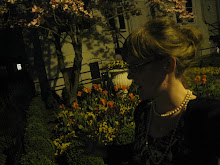Boys, boys, boys.
I recently watched High Fidelity for the millionth time as part of a poorly-executed attempt to get out of a state of despair. Note to self for future reference: When trying to remind oneself why it's fully okay to be a lone reed, watching John Cusack play the world's most adorable, likably fallible, well-listened boyfriend is probably not a great strategy. Oh well. It only confirmed what Chuck Klosterman has already proven: John Cusack ruined relationships for a whole generation by virtue of his sheer perfection--girls expect their one true love to be Lloyd Dobler, and guys can never hope to be so romantic. (Incidentally--and Freya, I know you'll back me up here--Chuck Klosterman has kind of ruined my Man Ideal too; you read his books and you fall in love with his prodigious knowledge of everything from Kirk Cameron's weird Christianity to pro sports to LA Guns and you fall in love a little; you turn to the back flap of Killing Yourself to Live and expect to fall in love a little more; and then you see this dorky dude staring out at you from the author photo in an ill-fitting T-shirt and, to quote Ally Sheedy in The Breakfast Club, "Your heart dies.")
High Fidelity did put me in the mood to read some more Nick Hornby, though, and when I couldn't get my hands on his latest novel, I settled for The Polysyllabic Spree, a collection of his bitchin' essays on reading from The Believer. Any book nerd should have to read this book. I am infintely envious of his reading tastes and the fact that people, like, SEND him BOOKS for his OPINION. I wish people would do the same thing for me. And when he picked up on a creepy similarity between sections in Seymour: An Introduction by J.D. Salinger and Fortress of Solitude by Jonathan Lethem, I knew I had found a man as truly anal in his reading as I aspire to be. This is also a book that fits neatly into a tote bag alongside dirty tupperware and twelve chapsticks and the other random crap I travel with, and is much less cumbersome than the stories of John Cheever, which I hauled home last night before realizing it was too big for transit reading.
And finally, because I'd planned to make this a post about books for boys, here is one of my favourites: Matthew and the Midnight Turkeys by Allen Morgan is one of my favourite picture books. It is totally off the wall and if you're looking for a book that kicks Walter the Farting Dog's ass, this is the one.

